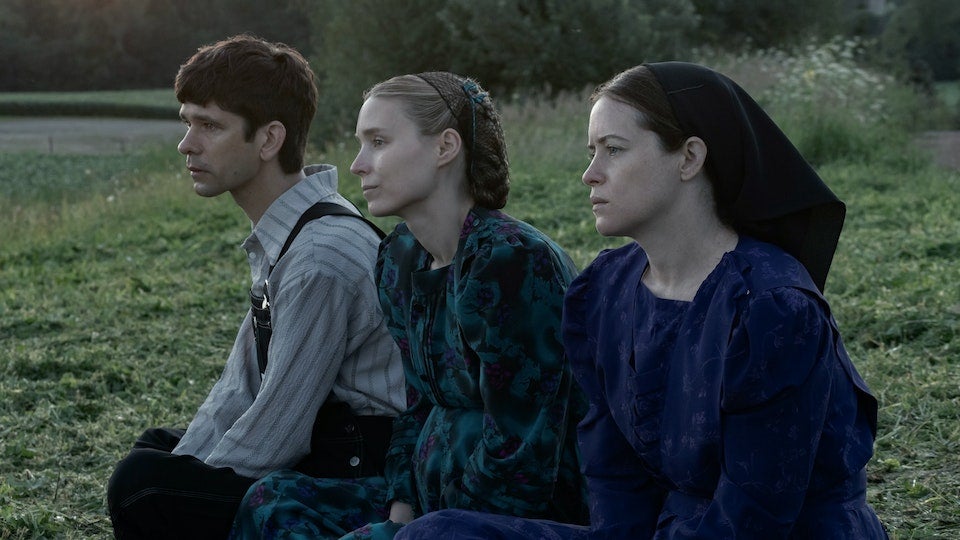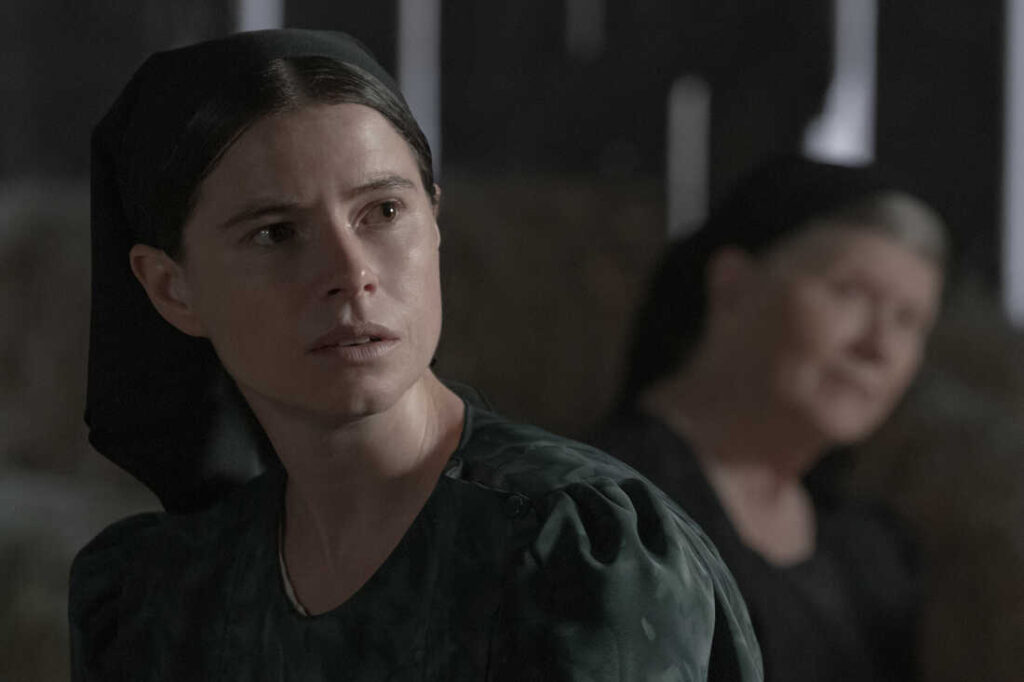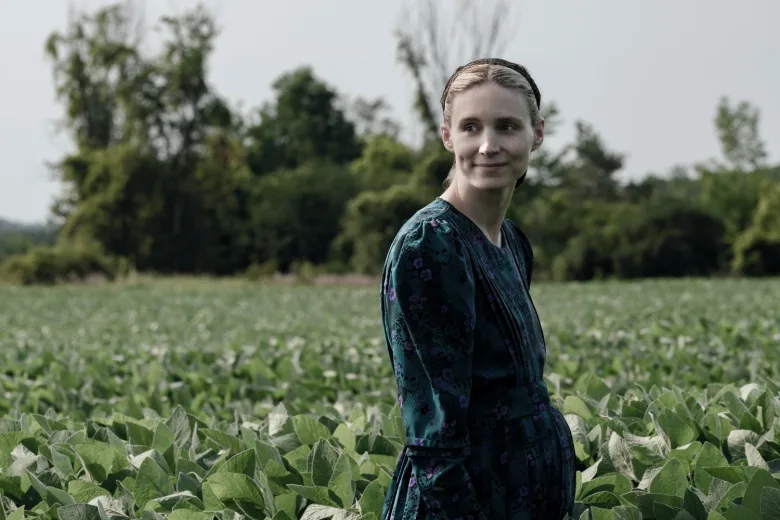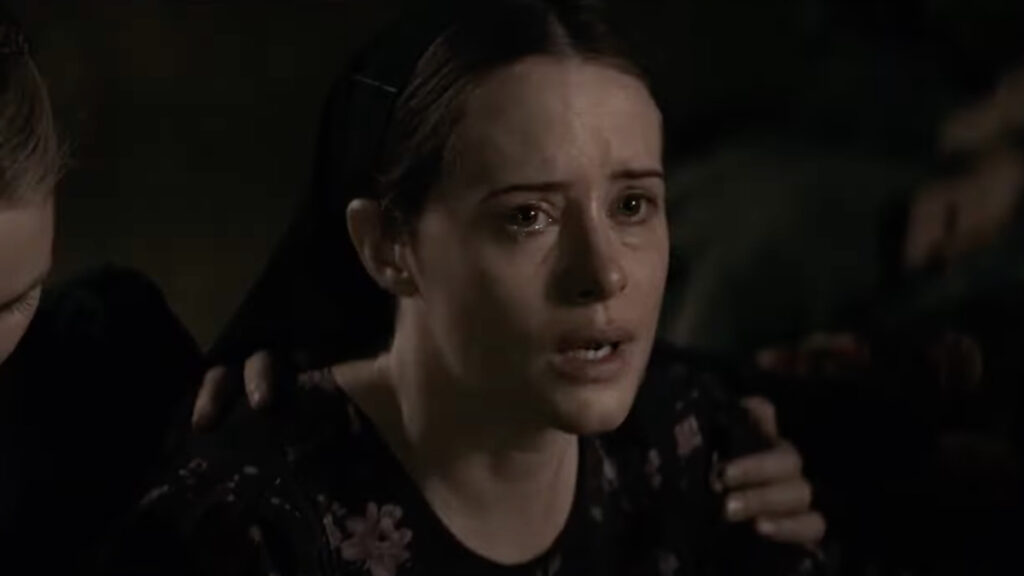
If you think the title of Women Talking is bluntly descriptive, wait until you hear the perspective of Neitje (Liv McNeil). Fifteen years old and perpetually frustrated, she takes stock of the surrounding proceedings—a nonstop parade of feminine discourse and verbiage—and groans, “This is so boring!” It’s a wry meta moment that also (ahem) speaks to the unenviable difficulties facing Sarah Polley, the gifted and empathetic director who has chosen, for her first feature in a decade, to adapt the popular novel by Miriam Toews. That title is no lie; this is a dialogue-driven movie with limited action (the catalyzing incidents occur offscreen) and minimal plot. The challenge for Polley, who also wrote the screenplay with Toews, is to invest what’s primarily a verbal exercise with cinematic verve and dramatic urgency.
If she doesn’t exactly succeed, she has at least answered Neitje’s complaint with guile and skill. Women Talking is hardly kinetic, but it’s paced briskly enough to stave off accusations of sluggishness. If anything, some of Polley’s editing techniques—rather than deploying typical flashbacks, she frequently inserts random, lightning-quick cuts to prior brutalities (blood smeared on walls, bruises dotting legs)—are too abrasive to be boring. These moments tend to be more distracting than disquieting, and they don’t so much jolt the story to life as disrupt its fluid rhythms. Still, Polley evades point-and-shoot banality, and some of the film’s artistic choices—the desaturated color scheme that looks like the camera is fighting through a scrim, the rippling guitar-plucked score from Hildur Guðnadóttir, the ominous overhead shot of wagons pushing past onlookers in white straw hats—lend double meaning to an early title card that reads, “What follows is an act of female imagination.”
That line suggests the possibility of whimsy, but despite a few snatches of humor (in particular the honest correction of a snarled profanity), the movie’s subject matter is almost unspeakably grave. Toews’ novel (which I haven’t read) is rooted in a nightmarish true-crime episode in Bolivia, where over 100 women in a Mennonite colony discovered that the men of their village had been systematically drugging and raping them for years. (The location here is unspecified, but accumulated details—the language, the racial composition, the wavy grain fields, the bullhorn declaring the 2010 census—would seem to imply Middle America.) Aside from the brief shot of an anonymous assailant fleeing into the dark night (plus those aforementioned jagged inserts), Polley declines to depict these atrocities, instead concerning herself with the victims’ responses in their aftermath.

It seems absurd to describe Women Talking as suspenseful, but its structure nonetheless echoes that of a ticking-clock picture. While the men of the community are temporarily preoccupied bailing their confederates (who are generally referred to as “the attackers”) out of jail, the illiterate women resolve to take a vote on their future, creating a pictorial ballot in which crude drawings symbolize three options: do nothing, stay and fight, or leave. After complications force them to pivot from direct democracy to a makeshift republic, a handful of representatives gather in a roomy barn to debate the proper course of action for the entire female population.
What transpires is a lengthy series of protracted and discursive conversations that tend to vacillate between provocative and tedious. The women talk and they talk, pondering questions spiritual, moral, and logistical. One elder, played in a brief appearance by Frances McDormand (who also produced), insists that they forgive their attackers, as mercy is the only way to guarantee their place in the kingdom of heaven. She is joined, at least in part, by Mariche (Jessie Buckley), a pragmatist who insists that remaining in their current station is the only sensible decision. On the opposite end of the spectrum is Salome (Claire Foy), a more militant personality—we first see her slashing at a perpetrator with a scythe—who equates pity with weakness, and who demands independence if not retribution. In the middle, often literally as well as philosophically, is the pregnant Ona (Rooney Mara), a soft-spoken negotiator who ensures every voice is heard and who consistently nudges the discussion into new territory. Quietly observing all of these chatty Cathys is August (Ben Whishaw), a local schoolteacher who has been recruited to serve as the meeting’s stenographer.

The names in those parentheticals are very fine actors, all of whom do their best to infuse the film’s narrative with dimension and feeling. Foy, in particular, relishes a number of fiery monologues that seem prepackaged to serve as Oscar clips (the movie just earned nominations for Best Picture and Best Adapted Screenplay, though none for its cast); her twitchy agita contrasts notably with Mara’s natural grace, along with Whishaw’s hushed sensitivity. A few scenes that tease out the gentle connection (“chemistry” would be too forceful a word) between Ona and August—in particular one where he mansplains astronomy to her—unfold with exquisite tenderness.
And yet, for all its rigor and compassion (the treatment of a trans character is deftly handled), Women Talking can’t conquer the fundamentally prosaic nature of its conceit. The problem isn’t the dreaded canard that “nothing happens”; it’s that everything happens at too great a distance. Despite the committed performances, the characters fail to transcend their archetypes: the angry one, the scared one, the smart one. (At times, August’s presence feels like a conciliatory gesture to the #NotAllMen crowd.) The movie’s point, which is valid and important, is that patriarchal abuse can fester anywhere, but its universality dulls its thematic impact, reducing lively figures to vague emblems.

I’m not suggesting that Polley should have supplied additional backstory or otherwise embellished her source material; to the contrary, I suspect (again, without having read the book) that her work constitutes a sincere and faithful adaptive effort. But that’s the issue. On the page, I can envision Women Talking working as a vibrant collage of ideas and a robust interrogation of modern gender norms. But on screen, where the participants in this invented dialogue are embodied in flesh and blood, the banter feels stiff and pedagogical. The characters are pantomiming a theoretical debate rather than behaving as real people.
At one point, Ona instructs August to create a large-lettered list of the pros and cons of their various options, which he can then affix to the barn’s walls. When someone remarks that none of the women assembled can actually read the list, Ona counters that it will nevertheless function as an artifact for future visitors. It’s a lovely insight that also exposes Women Talking’s ultimate limitations. What we have here is less a movie than a document: neatly organized, thoughtfully executed, and dry as parchment.
Grade: B-
Jeremy Beck is the editor-in-chief of MovieManifesto. He watches more movies and television than he probably should.
